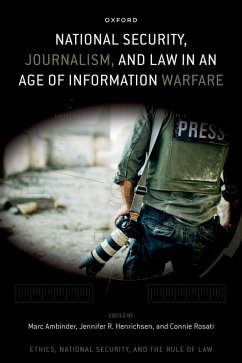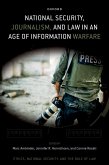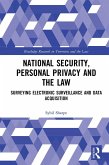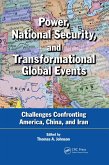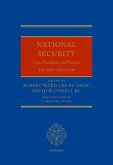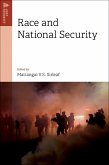National Security, Journalism, and Law in an Age of Information Warfare (eBook, PDF)
Redaktion: Ambinder, Marc; Rosati, Connie; Henrichsen, Jennifer R.
57,95 €
57,95 €
inkl. MwSt.
Sofort per Download lieferbar

29 °P sammeln
57,95 €
Als Download kaufen

57,95 €
inkl. MwSt.
Sofort per Download lieferbar

29 °P sammeln
Jetzt verschenken
Alle Infos zum eBook verschenken
57,95 €
inkl. MwSt.
Sofort per Download lieferbar
Alle Infos zum eBook verschenken

29 °P sammeln
National Security, Journalism, and Law in an Age of Information Warfare (eBook, PDF)
Redaktion: Ambinder, Marc; Rosati, Connie; Henrichsen, Jennifer R.
- Format: PDF
- Merkliste
- Auf die Merkliste
- Bewerten Bewerten
- Teilen
- Produkt teilen
- Produkterinnerung
- Produkterinnerung

Bitte loggen Sie sich zunächst in Ihr Kundenkonto ein oder registrieren Sie sich bei
bücher.de, um das eBook-Abo tolino select nutzen zu können.
Hier können Sie sich einloggen
Hier können Sie sich einloggen
Sie sind bereits eingeloggt. Klicken Sie auf 2. tolino select Abo, um fortzufahren.

Bitte loggen Sie sich zunächst in Ihr Kundenkonto ein oder registrieren Sie sich bei bücher.de, um das eBook-Abo tolino select nutzen zu können.
National Security, Journalism, and Law in an Age of Information Warfare helps one understand how secret-keepers, journalists, and sources are navigating unprecedented challenges in an age when trust in government and traditional media is low and the spread of disinformation through social media undermines efforts to inform and protect the public.
- Geräte: PC
- mit Kopierschutz
- eBook Hilfe
- Größe: 24.92MB
Andere Kunden interessierten sich auch für
![National Security, Journalism, and Law in an Age of Information Warfare (eBook, ePUB) National Security, Journalism, and Law in an Age of Information Warfare (eBook, ePUB)]() National Security, Journalism, and Law in an Age of Information Warfare (eBook, ePUB)58,95 €
National Security, Journalism, and Law in an Age of Information Warfare (eBook, ePUB)58,95 €![National Security, Personal Privacy and the Law (eBook, PDF) National Security, Personal Privacy and the Law (eBook, PDF)]() Sybil SharpeNational Security, Personal Privacy and the Law (eBook, PDF)41,95 €
Sybil SharpeNational Security, Personal Privacy and the Law (eBook, PDF)41,95 €![Disruptive Technology and the Law of Naval Warfare (eBook, PDF) Disruptive Technology and the Law of Naval Warfare (eBook, PDF)]() James KraskaDisruptive Technology and the Law of Naval Warfare (eBook, PDF)60,95 €
James KraskaDisruptive Technology and the Law of Naval Warfare (eBook, PDF)60,95 €![Power, National Security, and Transformational Global Events (eBook, PDF) Power, National Security, and Transformational Global Events (eBook, PDF)]() Power, National Security, and Transformational Global Events (eBook, PDF)55,95 €
Power, National Security, and Transformational Global Events (eBook, PDF)55,95 €![Emergency Action for Chemical and Biological Warfare Agents (eBook, PDF) Emergency Action for Chemical and Biological Warfare Agents (eBook, PDF)]() D. Hank EllisonEmergency Action for Chemical and Biological Warfare Agents (eBook, PDF)48,95 €
D. Hank EllisonEmergency Action for Chemical and Biological Warfare Agents (eBook, PDF)48,95 €![National Security Law, Procedure and Practice (eBook, PDF) National Security Law, Procedure and Practice (eBook, PDF)]() National Security Law, Procedure and Practice (eBook, PDF)203,95 €
National Security Law, Procedure and Practice (eBook, PDF)203,95 €![Race and National Security (eBook, PDF) Race and National Security (eBook, PDF)]() Race and National Security (eBook, PDF)21,95 €
Race and National Security (eBook, PDF)21,95 €-
-
-
National Security, Journalism, and Law in an Age of Information Warfare helps one understand how secret-keepers, journalists, and sources are navigating unprecedented challenges in an age when trust in government and traditional media is low and the spread of disinformation through social media undermines efforts to inform and protect the public.
Dieser Download kann aus rechtlichen Gründen nur mit Rechnungsadresse in A, B, BG, CY, CZ, D, DK, EW, E, FIN, F, GR, HR, H, IRL, I, LT, L, LR, M, NL, PL, P, R, S, SLO, SK ausgeliefert werden.
Produktdetails
- Produktdetails
- Verlag: OUP eBook
- Seitenzahl: 368
- Erscheinungstermin: 24. September 2024
- Englisch
- ISBN-13: 9780197756645
- Artikelnr.: 72258985
- Verlag: OUP eBook
- Seitenzahl: 368
- Erscheinungstermin: 24. September 2024
- Englisch
- ISBN-13: 9780197756645
- Artikelnr.: 72258985
- Herstellerkennzeichnung Die Herstellerinformationen sind derzeit nicht verfügbar.
Marc Ambinder is a misinformation policy lead at TikTok, and an adjunct professor of journalism at the University of Southern California's Annenberg School of Communications and Journalism, where he teaches investigative, national security, and political reporting. He is the author of three books on national security and a former White House correspondent and has spent more than 15 years in the trenches of print, digital, broadcasting, and magazine journalism. In 2017, he was a fellow at the Center for Ethics and the Rule of Law at the University of Pennsylvania Law School. He was recently awarded an N Square Fellowship from the Ploughshares Fund to work on innovative ways to communicate about the threat posed by nuclear weapons. Jennifer R. Henrichsen is an Assistant Professor at the Edward R. Murrow College of Communication at Washington State University. She is also an Affiliated Fellow at the Information Society Project at Yale Law School and an Affiliated Fellow at the University of Pennsylvania and Rutgers University's joint Media, Inequality, and Change Center. Dr. Henrichsen received her Ph.D. from the Annenberg School for Communication at the University of Pennsylvania. Dr. Henrichsen's research examines how adversaries exploit weaknesses in the spread of information across organizations and institutions to contaminate the information ecosystem and to erode trust in knowledge systems. Specifically, she assesses how these and other challenges - from state and corporate surveillance to physical and digital attacks against the media - are creating an epistemic crisis for journalism. Dr. Henrichsen's research has been published in top peer-reviewed journals, including Digital Journalism, the International Journal of Communication, Journalism Practice, Journalism Studies, Communication, Culture & Critique, New Media & Society, and Media, War & Conflict. She twice has been a consultant to UNESCO where she produced global reports on the state of journalism and she has served as a consultant to the Knight Foundation, the MacArthur Foundation, and the Ford Foundation. She has served on the Advisory Council for the Open Technology Fund and the Steering Committee for the Center for Media at Risk at Annenberg. Dr. Henrichsen has written articles about journalism and information security for Columbia Journalism Review and Poynter and she was previously a freelance journalist and a political correspondent. Dr. Henrichsen has received fellowships from Yale, Columbia University, the University of Fribourg, the Knight Foundation and First Look Media. A Fulbright Research Scholar, Dr. Henrichsen holds MA degrees from the University of Geneva and the University of Pennsylvania. In 2011, she co-wrote the book, War on Words: Who Should Protect Journalists? (Praeger) and in 2017 she co-edited the book, Journalism After Snowden: The Future of the Free Press in a Surveillance State(Columbia University Press). Connie S. Rosati is Roy Allison Vaughan Centennial Professor in Philosophy and Professor of Law at the University of Texas at Austin. She received a Ph.D. in Philosophy in 1989 from the University of Michigan and J.D. in 1998 from Harvard Law School. She has previously held positions at Rutgers University, Northwestern University, the University of California, Davis, and the University of Arizona, as well as visiting positions at the University of San Diego Law School, Arizona State University Law School, and the University of Pennsylvania Law School. Her research interests lie principally in moral philosophy and the foundations of ethics and in the nature and interpretation of constitutions. Recent publications include "Welfare and Rational Fit," "The Makropulos Case Revisited: Reflections on Immortality and Agency," "Constitutional Realism" and "The Moral Reading of Constitutions."
* FOREWORD: Gordon Stables
* EDITORS' INTRODUCTION: Marc Ambinder, Jennifer R. Henrichsen, and
Connie Rosati
* PART I: Rights and Duties of Journalists and News Organizations
* 1 Frederick Schauer, "On Obtaining National Security Information"
* 2 Matthew L. Schafer, "National Security and Access, a Structural
Perspective"
* 3 Hannah Bloch-Wehba, "A Fourth Amendment Press Clause"
* 4 Marc Ambinder, "Higher Restraint: National Security Reporting in An
Age of Information Anarchy"
* 5 Allison Puccioni, "Open Source Imagery Intelligence: Security
Implications in an Era of Unprecedented Access to Satellite Data"
* PART II: Government Pushback and Governmental Duties to Journalists
and News Organizations
* 6 George W. Croner, "The Government Pushes Back: Prosecuting Julian
Assange in the War Against Leaks - Trend or Aberration?"
* 7 Deborah L. Dwyer, "Watchdogs in the Digital Age: Digital
Surveillance, Information Security, and the Evolution of
Journalist-Confidential Source Relationships"
* 8 Barry J. Pollack and Brian J. Fleming, "Charging Journalists Under
the Espionage Act: Have We Reached a Tipping Point?"
* 9 David R. Carroll, "Using UK Law to Investigate Misuse of Data
During the 2016 US Election: Cambridge Analytica and the
Internationalization of Voter Analytics"
* 10 Jennifer R. Henrichsen, "Digital Shackles: The Political Economy
of Surveillance Technologies and the Emergence of Transnational
Surveillance Fascism"
* 11 Jennifer R. Henrichsen, Hannah Bloch-Wehba, Gabe Rottman, Grayson
Clary, and Emily Hockett, "Digital Surveillance and Its Impact on
Media Freedom: Navigating the Legal Landscape"
* PART III: National Security, Journalism, and the Digital Media
Ecosystem
* 12 Christopher J. Fuller, "Enemies Foreign and Domestic: America's
Media Ecosystem and the Externalization of Domestic Threats"
* 13 Susan E. McGregor, "Securing the Digital Media Ecosystem"
* 14 Courtney C. Radsch, "On the Frontlines of the Information Wars:
How Algorithmic Gatekeepers and National Security Impact Journalism"
* 15 Susan D. Moeller, "Weaponizing Images"
* EDITORS' INTRODUCTION: Marc Ambinder, Jennifer R. Henrichsen, and
Connie Rosati
* PART I: Rights and Duties of Journalists and News Organizations
* 1 Frederick Schauer, "On Obtaining National Security Information"
* 2 Matthew L. Schafer, "National Security and Access, a Structural
Perspective"
* 3 Hannah Bloch-Wehba, "A Fourth Amendment Press Clause"
* 4 Marc Ambinder, "Higher Restraint: National Security Reporting in An
Age of Information Anarchy"
* 5 Allison Puccioni, "Open Source Imagery Intelligence: Security
Implications in an Era of Unprecedented Access to Satellite Data"
* PART II: Government Pushback and Governmental Duties to Journalists
and News Organizations
* 6 George W. Croner, "The Government Pushes Back: Prosecuting Julian
Assange in the War Against Leaks - Trend or Aberration?"
* 7 Deborah L. Dwyer, "Watchdogs in the Digital Age: Digital
Surveillance, Information Security, and the Evolution of
Journalist-Confidential Source Relationships"
* 8 Barry J. Pollack and Brian J. Fleming, "Charging Journalists Under
the Espionage Act: Have We Reached a Tipping Point?"
* 9 David R. Carroll, "Using UK Law to Investigate Misuse of Data
During the 2016 US Election: Cambridge Analytica and the
Internationalization of Voter Analytics"
* 10 Jennifer R. Henrichsen, "Digital Shackles: The Political Economy
of Surveillance Technologies and the Emergence of Transnational
Surveillance Fascism"
* 11 Jennifer R. Henrichsen, Hannah Bloch-Wehba, Gabe Rottman, Grayson
Clary, and Emily Hockett, "Digital Surveillance and Its Impact on
Media Freedom: Navigating the Legal Landscape"
* PART III: National Security, Journalism, and the Digital Media
Ecosystem
* 12 Christopher J. Fuller, "Enemies Foreign and Domestic: America's
Media Ecosystem and the Externalization of Domestic Threats"
* 13 Susan E. McGregor, "Securing the Digital Media Ecosystem"
* 14 Courtney C. Radsch, "On the Frontlines of the Information Wars:
How Algorithmic Gatekeepers and National Security Impact Journalism"
* 15 Susan D. Moeller, "Weaponizing Images"
* FOREWORD: Gordon Stables
* EDITORS' INTRODUCTION: Marc Ambinder, Jennifer R. Henrichsen, and
Connie Rosati
* PART I: Rights and Duties of Journalists and News Organizations
* 1 Frederick Schauer, "On Obtaining National Security Information"
* 2 Matthew L. Schafer, "National Security and Access, a Structural
Perspective"
* 3 Hannah Bloch-Wehba, "A Fourth Amendment Press Clause"
* 4 Marc Ambinder, "Higher Restraint: National Security Reporting in An
Age of Information Anarchy"
* 5 Allison Puccioni, "Open Source Imagery Intelligence: Security
Implications in an Era of Unprecedented Access to Satellite Data"
* PART II: Government Pushback and Governmental Duties to Journalists
and News Organizations
* 6 George W. Croner, "The Government Pushes Back: Prosecuting Julian
Assange in the War Against Leaks - Trend or Aberration?"
* 7 Deborah L. Dwyer, "Watchdogs in the Digital Age: Digital
Surveillance, Information Security, and the Evolution of
Journalist-Confidential Source Relationships"
* 8 Barry J. Pollack and Brian J. Fleming, "Charging Journalists Under
the Espionage Act: Have We Reached a Tipping Point?"
* 9 David R. Carroll, "Using UK Law to Investigate Misuse of Data
During the 2016 US Election: Cambridge Analytica and the
Internationalization of Voter Analytics"
* 10 Jennifer R. Henrichsen, "Digital Shackles: The Political Economy
of Surveillance Technologies and the Emergence of Transnational
Surveillance Fascism"
* 11 Jennifer R. Henrichsen, Hannah Bloch-Wehba, Gabe Rottman, Grayson
Clary, and Emily Hockett, "Digital Surveillance and Its Impact on
Media Freedom: Navigating the Legal Landscape"
* PART III: National Security, Journalism, and the Digital Media
Ecosystem
* 12 Christopher J. Fuller, "Enemies Foreign and Domestic: America's
Media Ecosystem and the Externalization of Domestic Threats"
* 13 Susan E. McGregor, "Securing the Digital Media Ecosystem"
* 14 Courtney C. Radsch, "On the Frontlines of the Information Wars:
How Algorithmic Gatekeepers and National Security Impact Journalism"
* 15 Susan D. Moeller, "Weaponizing Images"
* EDITORS' INTRODUCTION: Marc Ambinder, Jennifer R. Henrichsen, and
Connie Rosati
* PART I: Rights and Duties of Journalists and News Organizations
* 1 Frederick Schauer, "On Obtaining National Security Information"
* 2 Matthew L. Schafer, "National Security and Access, a Structural
Perspective"
* 3 Hannah Bloch-Wehba, "A Fourth Amendment Press Clause"
* 4 Marc Ambinder, "Higher Restraint: National Security Reporting in An
Age of Information Anarchy"
* 5 Allison Puccioni, "Open Source Imagery Intelligence: Security
Implications in an Era of Unprecedented Access to Satellite Data"
* PART II: Government Pushback and Governmental Duties to Journalists
and News Organizations
* 6 George W. Croner, "The Government Pushes Back: Prosecuting Julian
Assange in the War Against Leaks - Trend or Aberration?"
* 7 Deborah L. Dwyer, "Watchdogs in the Digital Age: Digital
Surveillance, Information Security, and the Evolution of
Journalist-Confidential Source Relationships"
* 8 Barry J. Pollack and Brian J. Fleming, "Charging Journalists Under
the Espionage Act: Have We Reached a Tipping Point?"
* 9 David R. Carroll, "Using UK Law to Investigate Misuse of Data
During the 2016 US Election: Cambridge Analytica and the
Internationalization of Voter Analytics"
* 10 Jennifer R. Henrichsen, "Digital Shackles: The Political Economy
of Surveillance Technologies and the Emergence of Transnational
Surveillance Fascism"
* 11 Jennifer R. Henrichsen, Hannah Bloch-Wehba, Gabe Rottman, Grayson
Clary, and Emily Hockett, "Digital Surveillance and Its Impact on
Media Freedom: Navigating the Legal Landscape"
* PART III: National Security, Journalism, and the Digital Media
Ecosystem
* 12 Christopher J. Fuller, "Enemies Foreign and Domestic: America's
Media Ecosystem and the Externalization of Domestic Threats"
* 13 Susan E. McGregor, "Securing the Digital Media Ecosystem"
* 14 Courtney C. Radsch, "On the Frontlines of the Information Wars:
How Algorithmic Gatekeepers and National Security Impact Journalism"
* 15 Susan D. Moeller, "Weaponizing Images"
